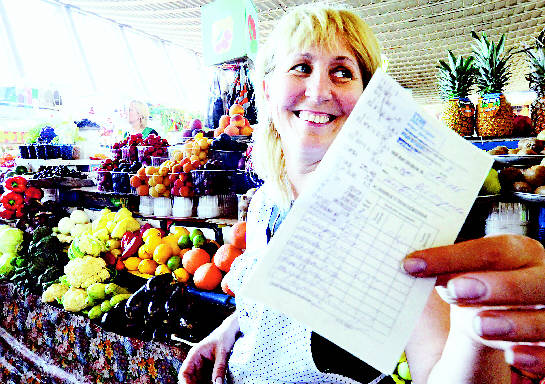Tomokatsu Sowa
In July, a delegation of farmers and citizens recruited by Fukushima city visited Belarus and Ukraine that were affected by the Chernobyl nuclear accident which occurred in Ukraine in 1986. A Japan Agricultural News reporter who accompanied the delegation writes about the people who are still struggling with radioactive substances to recover food safety 27 years after the accident.
In the Komarovski market in Minsk, the capital city of Belarus located some 340 kilometers northwest of the Chernobyl nuclear power plant, roughly 2,000 vegetable and fruit stalls stand next to each other in a 30,000-square-meter land. The state-operated market, centered upon a building with an undulating roof, is a popular local marketplace where 50,000 shoppers visit each day.
Walking by the stalls which sell farm products such as berries and tomatoes, one can see passport-size pieces of paper put up in front of them, indicating the items, the areas of production, the names of producers, the volume and the detected values of radioactive substances in terms of becquerels. They are certificates issued by the national inspection agency. People are not permitted to open stalls in the market unless they pass the sampling inspection test and receive the certificate.
Lyudmila Tomashevich, vice president of the market, appeals the fact that the market has built up trust among consumers. People understand that the products sold in the market have gone through inspections, so no one is reluctant to buy them out of fear that they are radioactively contaminated, she says.
An explosion and fire which broke out in the Chernobyl nuclear power plant in 1986 released large quantities of radioactive particles, which are said to be seven times as much as in the case of the Fukushima No.1 nuclear power plant accident of 2011. Due to the direction of the wind at the time, Belarus, the adjacent country located north of Ukraine, was most severely contaminated. People are still restricted to live within 30 kilometers of the nuclear power plant, and hotspots with especially high levels of radioactive elements are found scattered over a wide range of land.
In Belarus, each of the food markets must have inside it a national institute which measures the levels of radioactive cesium-137 and strontium-90 and issues certificates of inspection to sellers. Safety limits are specifically set according to each item, and as for cesium-137, the limits are set at the levels between 40 and 100 becquerels for fruits and vegetables. Japan’s safety limit is below 100 becquerels for cesium-134 and cesium-137 added together.
For the past 10 years or so, no products were found exceeding the safety limits in Belarus, except for occasional cases for wild berries and mushrooms and meat from wild animals such as wild boars.
Since July is the season for wild berries and mushrooms, it is the busiest time for inspection agencies, and also the time when food safety becomes a matter of high concern for consumers. During the season, media visit the markets at least once or twice a week and report on the results of inspections.
The situation is the same in Ukraine, as both countries have farming as their main industry. They are making persistent efforts, such as measuring radioactivity and issuing certificates, to ensure food safety so that people can feel reassured to buy products in markets.

A woman selling fruits at a market in Kiev, Ukraine, shows a radiation inspection certificate which proves that her products are safe.
In “Zhytniy rynok”, the oldest market in Ukraine’s capital city of Kiev, inspections have been conducted ever since the accident, but none of the inspected products exceeded the safety limits in the last six years. Viktor Baranov, head of Ukrainian Science Research Institute of Ecological Problems say there are less harmful rumors, but people are still reluctant to buy farm products grown in regions with relatively high levels of radioactive materials detected in the air.Junko Nagasawa, 55, a member of an agricultural cooperative in Fukushima who visited markets in both countries, said she recognized the seriousness of the accident which forces the countries to conduct inspections even after 27 years. Nagasawa, herself a fruit farmer, said the system of indicating the results of inspections visually at stores helps reassure both farmers and consumers that the products are safe.
In Fukushima, institutions such as the prefectural government, agricultural cooperatives and retailers conduct radiation measurements, but there are no official certificates.
Shuji Shimizu, professor of public finance at Fukushima University and vice head of the delegation, said that although it is difficult to introduce such certificates in Japan which has more complex distribution channels compared with Belarus, it is necessary to consider a system that fits the Japanese system.
(Aug. 6, 2013)

